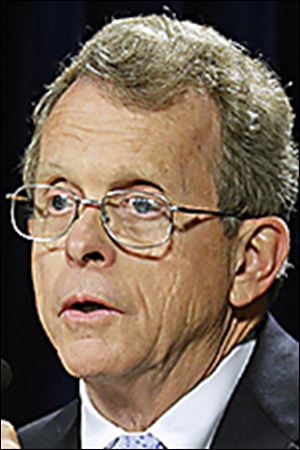
EDITORIAL
Lies and misdemeanors
The U.S. Supreme Court or state lawmakers must scrap Ohio’s unconstitutional restrictions on political speech
4/3/2014
DeWine
Ohio law bans knowingly or recklessly false statements in political campaigns. That makes about as much sense as outlawing the air we breathe.
This patently unconstitutional law even provides penalties of as much as six months in jail for a first offense. If politicians start doing time for lying on the campaign trail, government will have to close up shop.
The law has put Ohio Attorney General Mike DeWine in the awkward, even absurd, position of having simultaneously to defend and oppose a law that violates the freedoms — including free speech — guaranteed by the First Amendment.
Click here to read more Blade editorials.
The state’s chief legal officer is required to defend his state’s laws and the actions of the Ohio Elections Commission. At the same time, he believes, rightly, that the law violates the U.S. Constitution.
In straddling these dual obligations, Mr. DeWine has designated a special set of attorneys in his office to defend the state law before the U.S Supreme Court, while he urges justices to do the sensible thing and strike the law down. The high court is hearing two challenges to the law, both from Cincinnati.
These challenges will be considered as one case. The Supreme Court will likely throw out the law. If it doesn’t, Ohio lawmakers ought to repeal it.
The first challenge involves a political action committee that expressed support for a ballot proposal that would have stopped Cincinnati from building a streetcar system. The other came from a complaint filed by Susan B. Anthony List, an anti-abortion advocacy group that wanted to place a billboard advertisement in 2010 criticizing then-Rep. Steven Driehaus (D., Ohio).
Ohio law makes it illegal to “post, publish, circulate, distribute, or otherwise disseminate a false statement concerning a candidate, either knowing the same to be false or with reckless disregard of whether it was false or not, if the statement is designed to promote the election, nomination, or defeat of the candidate.” The law practically bans the defining characteristics of political advertising.
Legislators passed the law, presumably, to keep campaigns clean and honest. But even if regulating lies were constitutional, having bureaucrats determine when statements cross the line from misleading to recklessly false is a recipe for disaster.
That cannot be done in a fair, consistent, narrow, or objective manner. Making matters infinitely more unmanageable, the law also applies to the digital world, including Internet blogs and Facebook.
The law has had a chilling effect not only on candidates, but also on groups that seek to run political ads. As Mr. DeWine argued in his brief, a complaint, even if the election commission dismisses it, can intimidate speakers by forcing them to use time and resources to respond.
In truth, it’s stunning that, until now, a law that bans speech protected by the First Amendment has survived court challenges. That should change soon. A ruling by the Supreme Court is expected by late June, after justices hear arguments this month.
Either the high court or the legislature must scrap this unconstitutional restriction on political speech.